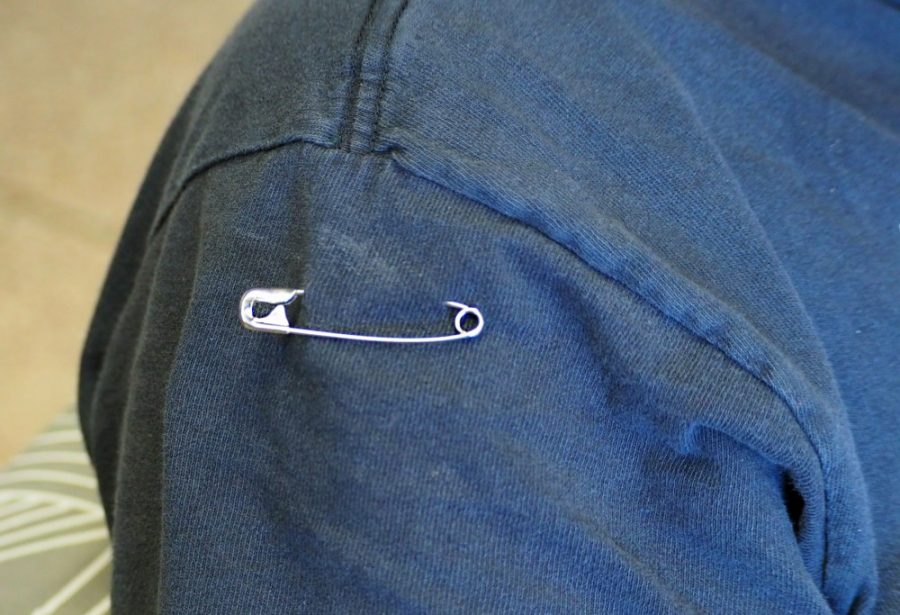People all over the country are wearing safety pins on their tops to show solidarity with marginalized groups after President-elect Donald Trump’s election win. This is their way of peacefully protesting Trump’s degrading, offensive campaign rhetoric that caused him to win over a large group of disgruntled voters across the country.
This is their immediate reaction to the hostility this election has awakened.
This is the beginning of a movement.
Celebrities, kids and regular people everywhere are uploading selfies with safety pins attached to their clothes all over social media. I see people wearing pins at the doctor’s office, at school, at the supermarket—everywhere. It’s become an impacting movement both on and offline.
The use of wearing safety pins to protest actually began in Britain after Brexit, which also disenfranchised many people. It was already established before Trump’s victory, but the win changed the way Americans everywhere saw themselves.
Immediately, the safety pin movement grew and became huge in the US.
RELATED: UA students and community react to the reality of a Trump presidency
Wearing these safety pins is meant to show to discriminated groups that you stand in solidarity with them, and that you are a person who will be there for them while they struggle to voice their opinions while protesting against the oppressive forces discriminating against them.
It’s a way to signal to someone that you are approachable, supportive and open to talk. It has allowed people to show their opinion in their everyday lives. It’s another label—a positive one, yes, but a label nonetheless.
Our world seems to be consumed by more and more labels each day.
In essence, this safety pin movement is a good thing and should be seen as one. It’s a new, easy way to rally support. It’s a way of creating community. It gets people together to protest and, regardless of how easy and silent this type of protest seems to others, it is effective.
It raises some awareness, which is a good thing. Some awareness is better than none at all.
But is this enough? Will this movement affect any change or just become the next cool thing to do? Do people see the issues being faced in this country as so simple that they can be combated with tiny metal pins?
A lot of people have criticized this movement, while others have praised it.
It seems that even when someone attempts to take a stand or show support, there is always someone else with the same goals and intentions who believes things should be handled differently.
RELATED: UA students, Tucson community react to Donald Trump’s win with ‘Not My President’ protest
Some people believe safety pin wearers should engage in more effective ways of protesting and actually take a strong stand.
Left-wing activists and protesters think wearing a safety pin is not strong enough to combat the grave and serious issues many face in wake of Trump’s election.
They’re hesitant about those who wear safety pins, questioning whether their intentions are genuine, or if they’re just joining a fad.
Society wants people to work—not to be invested, aware or active.
But, this is work.
We can’t try to control how people stand up or show support. Real things are happening out in our country; real people are in danger. Why are we mad that others are trying to show solidarity through safety pins?
Even if we believe that a safety pin cannot solve issues, why do we need to degrade people’s methods of supporting our cause? Of course it would be great if they could do more, but at least they’re doing something.
Sure, I would love to have this be something that encourages people to engage in other types of vocal protests instead of becoming a trend or a hipster way of living. But we have to start somewhere.
We can’t tear other people down simply because their way of lending support is not as loud or big as we would hope—at least they’re being supportive or being minimally vocal about it.
At least they are aware that marginalized groups and disenfranchised groups are out there and are suffering. At least they aren’t going against us.
We shouldn’t be combating people within our own side of the issue.
People should be encouraging this safety pin movement. As silly, tiny and as pointless as you may think it is, it’s impactful at getting people talking.
I literally just wrote a full column on it.
Follow Julian Cardenas on Twitter.









